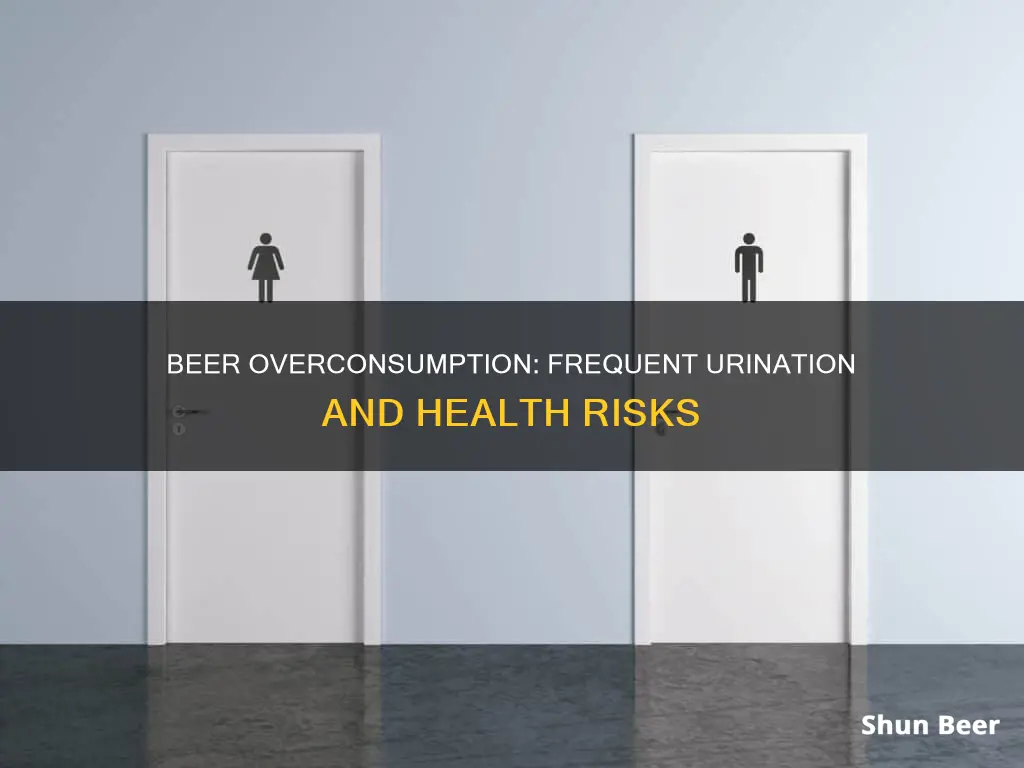
Drinking too much beer can indeed cause frequent urination. Alcohol is a diuretic, which means that consuming it will make you produce more urine and, therefore, need to urinate more often. This is because alcohol suppresses the release of the antidiuretic hormone (ADH) or vasopressin, which normally signals the kidneys to retain water. As a result, the kidneys release more water, leading to dehydration and increased urination. Additionally, alcohol is a liquid, so it tips the osmolality ratio in favour of more fluid, resulting in the body ultimately eliminating what is consumed. While lower-alcohol beverages like beer don't have as strong a diuretic effect as higher-alcohol drinks, they can still cause frequent urination.
| Characteristics | Values |
|---|---|
| Is "breaking the seal" a real thing? | No, it's a myth. |
| Why does drinking beer cause frequent urination? | Beer is a diuretic, which means it makes you produce more urine. |
| How does it work? | Alcohol suppresses the release of the antidiuretic hormone (ADH) or vasopressin, which helps the body retain water. |
| Does the amount of alcohol matter? | Yes, according to a study, urine output increased when alcohol content went up from 2% to 4%. |
| Does the type of alcohol matter? | Yes, lower-alcohol beverages like beer don't have as much of a diuretic effect as higher-alcohol beverages like wine and distilled liquors. |
| Does hydration level matter? | Yes, people who are slightly dehydrated before drinking alcohol urinate less than those who are hydrated, even when drinking the same amount of alcohol. |
What You'll Learn
- Beer is a diuretic, meaning you'll produce more urine
- Alcohol suppresses the antidiuretic hormone (ADH), which stops the kidneys from making too much urine
- Beer contains sodium, which retains body fluids and restores lost plasma volume
- Beer phytochemicals, such as phenolic acids and flavonoids, have diuretic effects
- Beer is a bladder stimulant, meaning the more you drink, the more you'll need to urinate

Beer is a diuretic, meaning you'll produce more urine
The more alcohol you drink, the more you'll find yourself needing to urinate. This is because alcohol is a liquid, so it tips the balance in favour of more fluid. As a result, you'll ultimately pee out roughly the equivalent of what you drink. However, it's important to note that this doesn't mean you should drink less water to avoid urinating as this will only make you feel worse later.
The frequency of urination also depends on your hydration levels before drinking. People who are slightly dehydrated before drinking alcohol will urinate less than those who are well-hydrated, even when drinking the same amount of alcohol. However, most research suggests that people's bodies still respond differently to alcohol, so while some people may find they pee more when they drink, others may pee less.
The idea of "breaking the seal" is a myth. The concept goes that if you urinate for the first time after starting to drink, you'll need to go more frequently. However, as soon as you start drinking, the alcohol causes urine to build up faster, so after the first time you pee, your urine will accumulate faster than normal, making subsequent trips to the bathroom more frequent.
It's not a good idea to resist the urge to urinate when drinking alcohol as this can increase your risk of urinary tract infections (UTIs) and affect your bladder-brain connection that signals when you need to pee.
Tongue Piercing and Beer: What's Safe?
You may want to see also

Alcohol suppresses the antidiuretic hormone (ADH), which stops the kidneys from making too much urine
Alcohol suppresses the antidiuretic hormone (ADH), which is also known as vasopressin. This hormone is produced by the body to promote water absorption and prevent dehydration. When alcohol is consumed, it inhibits the release of ADH, which causes the body to absorb less water. This results in increased urine production and can lead to dehydration. The diuretic effect of alcohol can be influenced by various factors, including the alcohol content of the beverage, the individual's hydration levels before drinking, and the frequency of drinking.
The diuretic effect of alcohol is not limited to beer but is also observed with other alcoholic beverages such as wine and distilled liquors. However, lower-alcohol beverages like beer may have a less pronounced diuretic effect. Additionally, frequent drinking can lead to the body becoming accustomed to the presence of alcohol, reducing the diuretic effects over time.
While alcohol does suppress ADH and increase urine production, it is important to note that it is not the only factor contributing to frequent urination. The total amount of fluid consumed, including water, can also impact urination frequency. Additionally, alcohol is a central nervous system depressant, which can relax the bladder muscles and contribute to a reduced bladder capacity.
To manage frequent urination when consuming alcohol, it is recommended to drink beverages with lower alcohol content, stay hydrated by drinking plenty of water, and avoid caffeinated mixers, as caffeine can further increase urine production.
Beer Science: Brewing Basics and Beyond
You may want to see also

Beer contains sodium, which retains body fluids and restores lost plasma volume
Drinking too much beer can cause frequent urination. Alcohol is a diuretic, which means that consuming it will make you produce more urine and, therefore, urinate more frequently.
Beer contains sodium, which plays a key role in retaining body fluids and restoring lost plasma volume. Sodium is the main substance dissolved in the body and, thus, largely determines the osmolality of plasma. Osmolality refers to the ratio of particles in the blood to fluid. When there is more fluid than particles in the blood, the kidneys hold on to the fluid, and the urge to urinate decreases. Conversely, when there are more particles than fluid, the kidneys release more urine.
The body strives to maintain a constant level of sodium and water. The kidneys are the most important control point for this homeostatic process, with sensors from various parts of the body providing feedback. The goal is to preserve plasma osmolality (saltiness) between 275-300 mOsm/kg and sodium levels between 135-145 mEq/L. When plasma volume or sodium concentration gets too high, sensors in the heart, blood vessels, and kidneys detect this and trigger processes to increase their excretion through the kidneys. Conversely, when blood plasma volume or sodium concentration becomes too low, the sensors trigger processes to increase their reabsorption through the kidneys.
The body's endocrine system, a complex chemical messaging system made up of feedback loops of hormones, regulates both functions. The antidiuretic hormone (ADH), also known as vasopressin, is responsible for regulating the body's retention of water. It is secreted by the hypothalamus in response to an increase in plasma osmolality, decreased blood volume, decreased blood pressure, and/or stress. ADH acts on the nephrons of the kidneys, facilitating the reabsorption of water and increasing the water permeability of the cell walls. This results in increased passive movement of water out of the kidneys back into the bloodstream and a subsequent reduction in urine volume.
When there is an increase in total body water, plasma osmolality falls due to a relative decrease in sodium concentration. Under these conditions, water moves out of the extracellular fluid into the body cells, causing them to expand. Receptors within the cells respond to this swelling by signalling to the hypothalamus to slow down the secretion of ADH. With less ADH circulating, there is a reduction in the amount of water reabsorbed into the blood, leading to increased urine production and subsequent restoration of fluid balance in the body.
In the context of beer consumption, the sodium it contains can help to retain body fluids and restore lost plasma volume. However, excessive beer consumption, particularly when combined with inadequate food intake, can lead to severe hyponatremia, also known as "beer potomania." This condition is characterized by extremely low sodium levels in the blood and can have serious neurological consequences.
Beer and Nuns: A Complex Relationship Explored
You may want to see also

Beer phytochemicals, such as phenolic acids and flavonoids, have diuretic effects
Beer is a diuretic, meaning it increases urine production. Beer contains phytochemicals, which are plant-based compounds with antioxidant properties. Phenolic acids and flavonoids are two phytochemicals present in beer. Phenolic acids are a subclass of plant phenolics, which are the most abundant secondary metabolites produced by plants. They are found in the highest concentrations in the seeds, skins, and leaves of fruits and vegetables. Phenolic acids possess a phenol moiety and a resonance-stabilized structure, which allows them to act as antioxidants by donating hydrogen atoms and scavenging free radicals.
Flavonoids are another subclass of plant phenolics, which are also found in vegetables and fruits. They have been shown to have antihypertensive, antidiabetic, and anti-inflammatory effects, among other therapeutic activities. They also affect several renal factors that promote diuresis and natriuresis, which may contribute to their well-known antihypertensive effect. Flavonoids have been found to prevent or ameliorate renal injury associated with arterial hypertension, both by decreasing blood pressure and by acting directly on the renal parenchyma.
In summary, beer phytochemicals, such as phenolic acids and flavonoids, have diuretic effects. These compounds are naturally occurring in plants and have various health benefits, including antioxidant, anti-inflammatory, and renoprotective properties.
Gas Blending: How Does a Beer Gas Blender Work?
You may want to see also

Beer is a bladder stimulant, meaning the more you drink, the more you'll need to urinate
Beer is a diuretic, which means that drinking it will make you produce more urine and, therefore, need to urinate more frequently. Beer is made up mostly of water, and the volume of urine you produce is largely determined by the volume of water ingested. However, there are other factors at play that cause you to need to urinate more when drinking beer.
Firstly, beer suppresses the release of the antidiuretic hormone (ADH) in your body. Normally, the brain signals the release of ADH in response to an increase in particles over fluids in the blood. ADH signals your kidneys to hold on to water. By suppressing ADH, beer can make the kidneys release more water, leading to a dehydrating effect on the body that not only makes you urinate more but can also cause headaches and nausea.
Secondly, beer is a liquid, and your kidneys regulate the amount of water in your body by monitoring the plasma osmolality of your blood. Osmolality is the ratio of particles in your blood to fluid. When you have more fluid than particles, your kidneys tell your body to release more urine. Because beer is a liquid, it tips the osmolality in favour of more fluid, and you will ultimately urinate out the equivalent of what you drink.
Thirdly, the more you drink, the more your detrusor muscles contract, causing the bladder to fill up quicker than normal. If you don't empty your bladder, it will continue to fill up, and you may wet the bed or wet yourself.
Finally, the phytochemicals in beer, such as phenolic acids and flavonoids, have diuretic effects.
Beer and Gallstones: What's the Connection?
You may want to see also
Frequently asked questions
Yes, drinking beer can cause frequent urination. Beer is a diuretic, which means that consuming it will make you produce more urine and, therefore, need to urinate more often.
Beer contains alcohol, which is a diuretic. This means that drinking alcohol inhibits the release of the antidiuretic hormone (ADH) or vasopressin. This hormone normally signals the kidneys to hold on to water. When its release is suppressed, the kidneys release more water, leading to increased urination and potential dehydration.
Yes, the amount of alcohol in a drink can affect how much you urinate. Studies have shown that drinking moderate amounts of higher-alcohol beverages like wine or distilled liquors had a greater diuretic effect than lower-alcohol beverages like beer.
Yes, drinking excessive amounts of beer can cause dehydration and health issues related to dehydration. In addition, drinking too much alcohol can lead to bladder weakness and, in some cases, bladder rupture.







